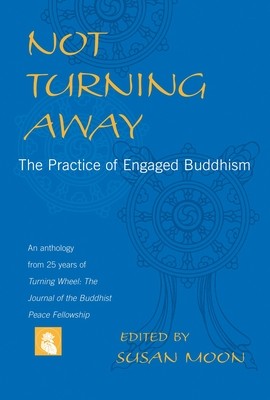
- We will send in 10–14 business days.
- Author: Susan Moon
- Publisher: Shambhala
- ISBN-10: 159030103X
- ISBN-13: 9781590301036
- Format: 15.5 x 22.7 x 1.7 cm, softcover
- Language: English
- SAVE -10% with code: EXTRA
Reviews
Description
The term "engaged Buddhism" was coined by the Zen teacher Thich Nhat Hanh as a way of asserting that Buddhism should not be passive or otherworldly, but on the contrary, that Buddhists should be deeply, compassionately involved in every aspect of society where suffering arises. Not Turning Away is a treasury of writings on the philosophy and practice of engaged Buddhism by some of the most well-known and respected figures in the movement, gleaned from the pages of the magazine that is the primary forum for engaged Buddhism in America and elsewhere: Turning Wheel: The Journal of the Buddhist Peace Fellowship.
Not Turning Away provides a history of the engaged Buddhism movement, an analysis of its underlying principles, and inspiring practical examples of real people's experiences in putting spiritual practice to the test on the personal, national, and global levels. The range of topics--from political oppression to prison work, disability, racism, poverty, nonviolence, forgiveness, the student-teacher relationship, and homelessness--demonstrates the applicability of Buddhist teaching to every concern of modern life. Contributors include: Robert AitkenJan Chozen Bays
Melody Ermachild Chavis
Zoketsu Norman Fischer
Thich Nhat Hanh
Jack Kornfield
Kenneth Kraft
Joanna Macy
Jarvis Jay Masters
Fleet Maull
Susan Moon
Wendy Egyoku Nakao
Maylie Scott
Gary Snyder
Robert Thurman
Joan Tollifson
Diana Winston
EXTRA 10 % discount with code: EXTRA
The promotion ends in 19d.00:38:50
The discount code is valid when purchasing from 10 €. Discounts do not stack.
- Author: Susan Moon
- Publisher: Shambhala
- ISBN-10: 159030103X
- ISBN-13: 9781590301036
- Format: 15.5 x 22.7 x 1.7 cm, softcover
- Language: English English
The term "engaged Buddhism" was coined by the Zen teacher Thich Nhat Hanh as a way of asserting that Buddhism should not be passive or otherworldly, but on the contrary, that Buddhists should be deeply, compassionately involved in every aspect of society where suffering arises. Not Turning Away is a treasury of writings on the philosophy and practice of engaged Buddhism by some of the most well-known and respected figures in the movement, gleaned from the pages of the magazine that is the primary forum for engaged Buddhism in America and elsewhere: Turning Wheel: The Journal of the Buddhist Peace Fellowship.
Not Turning Away provides a history of the engaged Buddhism movement, an analysis of its underlying principles, and inspiring practical examples of real people's experiences in putting spiritual practice to the test on the personal, national, and global levels. The range of topics--from political oppression to prison work, disability, racism, poverty, nonviolence, forgiveness, the student-teacher relationship, and homelessness--demonstrates the applicability of Buddhist teaching to every concern of modern life. Contributors include: Robert AitkenJan Chozen Bays
Melody Ermachild Chavis
Zoketsu Norman Fischer
Thich Nhat Hanh
Jack Kornfield
Kenneth Kraft
Joanna Macy
Jarvis Jay Masters
Fleet Maull
Susan Moon
Wendy Egyoku Nakao
Maylie Scott
Gary Snyder
Robert Thurman
Joan Tollifson
Diana Winston


Reviews